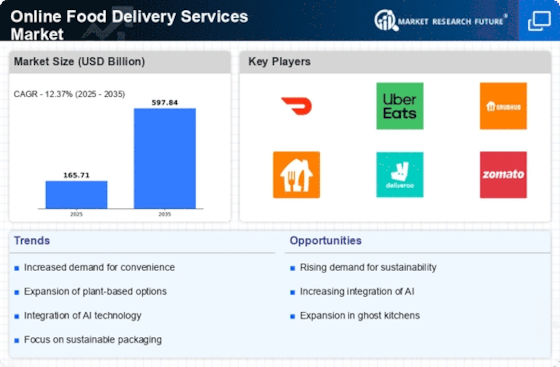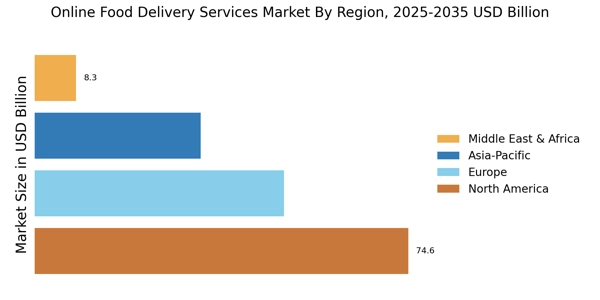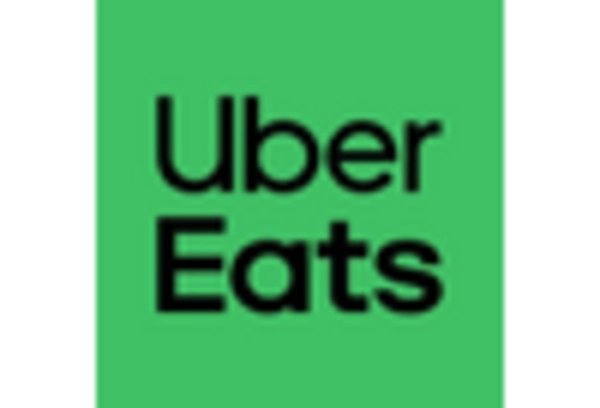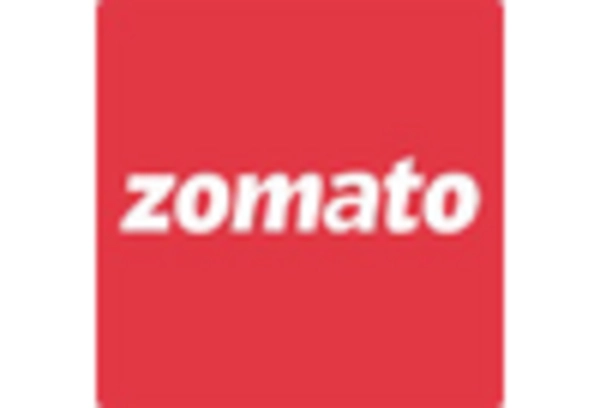Changing Consumer Lifestyles
The evolution of consumer lifestyles plays a pivotal role in shaping the Online Food Delivery Services Market. As individuals become busier with work and personal commitments, the demand for convenient meal solutions has surged. Recent data indicates that around 60% of consumers prefer ordering food online rather than cooking at home, reflecting a shift in dining habits. This trend is particularly pronounced among younger demographics, who prioritize convenience and speed. Additionally, the rise of remote work has further fueled this demand, as individuals seek quick meal options during their work-from-home routines. The Online Food Delivery Services Market is thus adapting to these changing preferences, with many platforms offering tailored services to meet the needs of time-constrained consumers. This shift suggests a sustained growth trajectory for the industry as it aligns with modern lifestyle demands.
Expansion of Delivery Options
The diversification of delivery options is significantly influencing the Online Food Delivery Services Market. As of October 2025, many platforms are expanding their services beyond traditional restaurant deliveries to include grocery and meal kit deliveries. This expansion caters to a broader audience, appealing to consumers seeking convenience in various aspects of their food purchasing. Moreover, the introduction of subscription models and partnerships with local grocery stores has enhanced the appeal of these services. Data indicates that nearly 30% of consumers are now utilizing food delivery services for grocery shopping, showcasing a shift in consumer behavior. This trend not only broadens the market scope but also encourages competition among service providers, leading to improved service quality and innovation. The Online Food Delivery Services Market is thus poised for continued growth as it adapts to these evolving consumer needs.
Innovative Marketing Strategies
The implementation of innovative marketing strategies is a crucial driver in the Online Food Delivery Services Market. As competition intensifies, companies are increasingly leveraging digital marketing techniques to attract and retain customers. Data shows that around 70% of consumers are influenced by social media promotions and targeted advertisements when choosing food delivery services. This trend has led to the adoption of influencer partnerships and personalized marketing campaigns, which appear to resonate well with younger audiences. Furthermore, loyalty programs and referral incentives are being utilized to enhance customer retention, fostering a sense of community among users. The Online Food Delivery Services Market is thus witnessing a transformation in how brands engage with consumers, suggesting that effective marketing strategies will play a vital role in shaping future growth.
Health-Conscious Consumer Trends
The increasing awareness of health and wellness is reshaping the Online Food Delivery Services Market. Consumers are becoming more discerning about their food choices, seeking healthier options that align with their dietary preferences. Recent surveys indicate that approximately 40% of consumers are actively looking for nutritious meal options when ordering food online. This trend has prompted many delivery platforms to collaborate with restaurants that offer organic, vegan, and gluten-free options, thereby catering to health-conscious consumers. Additionally, the rise of meal customization features allows users to tailor their orders according to specific dietary needs. This shift towards healthier eating habits suggests that the Online Food Delivery Services Market must continue to innovate and adapt to meet the demands of a more health-aware consumer base, potentially leading to new market opportunities.
Increased Smartphone Penetration
The proliferation of smartphones has transformed the Online Food Delivery Services Market. As of October 2025, approximately 80% of the population in developed regions owns a smartphone, facilitating easy access to food delivery applications. This trend is not limited to urban areas; even suburban and rural regions are witnessing a surge in smartphone usage. Consequently, consumers are increasingly inclined to order food online, leading to a significant rise in demand for delivery services. The convenience offered by mobile applications, coupled with user-friendly interfaces, appears to be a driving force behind this growth. Furthermore, the integration of payment gateways and real-time tracking features enhances user experience, making online food ordering more appealing. This shift in consumer behavior suggests that the Online Food Delivery Services Market is likely to continue expanding as smartphone adoption rates increase.

















